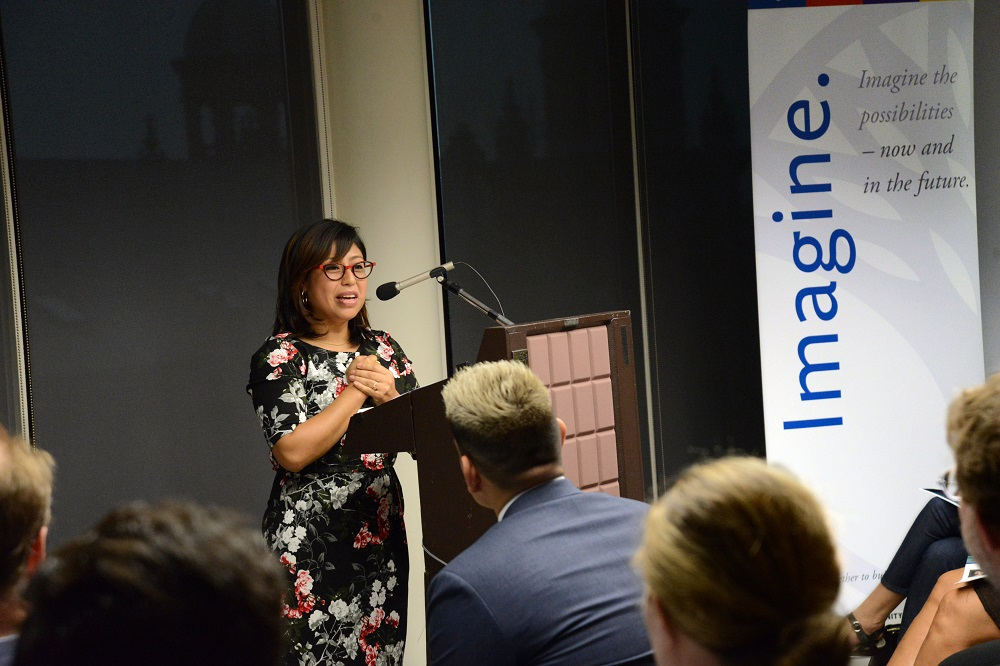Donor Briefing: United We Dream Founder Shares Her Story
For more than a decade, Cristina Jiménez — a MacArthur Fellow and member of Time magazine's "Time 100" list of the world's most influential people of 2018 — has fought for the same foundational American values that enticed her parents to risk everything and bring her to the U.S. at a young age.
 |
| United We Dream Executive Director and Co-Founder Cristina Jiménez shares her personal experience as an undocumented immigrant in "The Journey from 'Dreamer' to MacArthur Fellow." |
Cristina Jiménez brings message of courage and hope for immigrants to The Foundation's May 15 Donor Briefing
For more than a decade, Cristina Jiménez — a MacArthur Fellow and member of Time magazine's "Time 100" list of the world's most influential people of 2018 — has fought for the same foundational American values that enticed her parents to risk everything and bring her to the U.S. at a young age. The defense of liberty, of equal rights for all people and of the belief that dreams can be reached by anyone willing to work hard are central to her work as a social justice organizer.
As a leader of the 400,000-member immigrant rights organization United We Dream, Jiménez was part of the campaign that helped secure the protection of nearly one million young undocumented immigrants, the "Dreamers," from deportation through the Deferred Action for Childhood Arrivals (DACA) program. The experience gives Jiménez hope, despite DACA's recent suspension and increasingly punitive immigration policies that sanction stripping children away from their parents.
What we heard
Collective Action Strengthens Community
When Jiménez began organizing undocumented students as an undergraduate at CUNY, she and her peers were terrified of becoming easy targets for deportation. Over time, they conquered their fears by working together and advocating for change. "The act of self-determination, of coming together to say, 'we are undocumented and unafraid,' built a very vibrant community," says Jiménez.
"Act of Love" is Marked as Criminal
In 2010, thousands of "Dreamers" packed the halls of the Capitol while Congress took up legislation to create a pathway to permanent residency: The DREAM (Development, Relief and Education for Alien Minors) Act. The legislation was ultimately defeated. During the process, many legislators said they would only support the "Dreamers" in exchange for deporting their parents. "We saw our parents as heroes," says Jiménez. "They showed they would do anything for their kids. And their act of love was marked as a criminal act."
Movements are About People
Community-based organizations are the training grounds for the next generation of leaders. Support from funders like The Community Foundation is the reason Jiménez says hers and other young voices are on the national stage. "If we didn't invest in the people to lead, we wouldn't have a movement," says Jiménez.
Local Victories Give Reason for Hope
At the national level, the immigration debate has become increasingly divisive. Policies have become harsher and enforcement agents are empowered to detain people indefinitely and remove children from their parents. Jiménez and Connecticut Students for a Dream (C4D) Director Lucas Codognolla point to local successes as cause for hope. C4D successfully advocated for undocumented students to receive in-state tuition and this year, and Connecticut passed state legislation to provide undocumented students access to financial aid. "In this very difficult time, we can create change and we can fight back," says Jiménez.
What We Can Do
Be an Ally
The lives of thousands of immigrants who have known no other home besides this country are in danger. Even young people with DACA are being targeted for deportation. Become a part of the "Here to Stay" network and share their powerful stories.
Did You Know?
- The DREAM Act would create 1.4 million jobs by 2030, primarily through the expected increase in educational attainment, earnings and buying power for "DREAMers," according to a study conducted by the Center for American Progress.
- Undocumented immigrants in Connecticut paid an estimated $124.7 million in state and local taxes in 2014, according to the Institute on Taxation and Economic Policy (ITEP) Their contribution would rise to $145.3 million if they could receive legal status.
Additional Links & Resources
- United We Dream
- Connecticut Students for a Dream
- Understanding the Impact of Immigration in Greater New Haven
- The Community Foundation Info Brief: "Threats to Immigrants Impact Us All"
About The Foundation's Donor Briefing Series
Our ongoing Donor Briefing series invites guest experts to discuss urgent issues affecting us locally and nationally and to inform us about what can be done. Learn more
